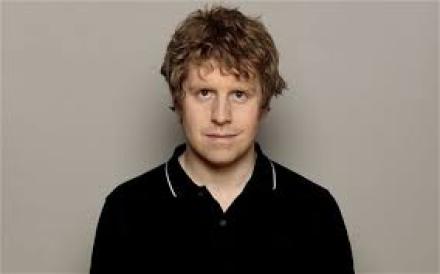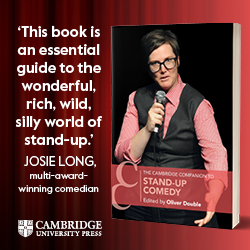
Stewart Lee – stand up
He is on tour with A Room With A Stew until January 2016. Details at www.stewartlee.co.uk
I have no idea how to advise anyone to write comedy today, as I started 25 years ago when the economic climate and the way arts were valued was entirely different. The jobs that paid me, and bought me time, while I learned to write, would now be unpaid internships. The English degree that I did would now be impossibly expensive for someone from my background. And the 47-year-old me wouldn't want the 21-year-old me to sign with one of the few big agencies that essentially control what gets commissioned. I think it's a waste of time for young people to try and write comedy today.
Ged Parsons – TV writer
Writer on Have I Got News For You.
Study comedy you like – see how it works. Don't copy it, be inspired by it. Learn how to present scripts. Spell everything correctly – detials matter. That was a joke. Send a little of your best material to the creators of programmes you like – tell them why you like their work. Ensure some of these programmes are BBC open-access radio-comedy shows – these are probably your best way in. Keep writing – then, keep writing. Maybe hold producers hostage, until they use your work. Do lots of work for free – apparently, it's good exposure. One of the previous two points is bad advice – (clue: it's not the 'hostage' one.)
John Kearns – stand-up
The 2014 Foster’s Edinburgh Comedy Award winner has just filmed a new sitcom, Top Coppers to go out on BBC3 later this year.
Advice commonly given to young comics is 'be honest' and 'do what makes you laugh.' I always found it a paradox. I was brought up on absurdism yet how can that go hand in hand with how I feel? The trick was to detach myself from my usual melodramatic, anxious self. I put on a wig, some false teeth and walked around like Rooster from the play Jerusalem. I felt stupid, silly and bizarrely free. Crucially it allowed me to be honest. It was this resignation that allowed me to firstly be funny and secondly say what I wanted. I had a ‘Oh, I’m that guy’ moment. When you have that, the writing follows.
Holly Walsh – stand-up/TV and radio writer
Walsh's new series Best Behaviour starts on R4 on May 7 at 6.30pm.
My tip for writing comedy would be to find someone to collaborate with. OK, so you’ll share the money, but you’ll also share self-doubt and inner loathing, so it kind of balances out. My favourite days are sitting in a room with someone else and trying to make them laugh. You might then have to go off and work stuff up on your own, but at least you know one person has found it funny. Oh, and move around. You’d be surprised how many problems are solved walking to and from the loo. So drink plenty of tea.
Susan Calman – stand-up
Susan Calman is touring nationally. For more information see www.susancalman.com
Write often and write lots. Eventually, or at least hopefully, the rubbish will lessen and the gold will increase. Use language deliberately, and I don’t mean punctuation by swearing. Details can be so important. If you’re writing a joke about a car what type of car is it? Does it help to mention the colour? “She arrived in a puce Nissan Micra” can help an audience get an immediate idea of a character. Concise use of language is a joke writers’ secret power. “Someone came to my door last night and indicated I should answer it”, is far less efficient than “Knock, Knock”. Most importantly find a hat to wear while you’re writing. All successful comedy writers have one. I have a Top Hat. It makes me 36% funnier.
Ross Noble – stand-up
Ross Noble Freewheeling is available on catch-up at UKTV Play.
The only way to get good at stand-up is to do it lots and lots until you are as comfortable onstage as you are off. Some people are good quicker but to be really good is about putting in the hours on stage. When most people start they don't know who they are or what there point of view is onstage. Until you figure that out you are just someone reciting a list of jokes. Often newer comics will do any joke they think of even if it contradicts previous ideas. It may get a laugh but leaves the audience confused as to who you are and what your point of view is. Don’t do what you think an audience wants to hear, do what you find funny and if you are truly funny and you have a strong point of view they will laugh. The key to improvising on stage is the same as writing and that is to not censor yourself – let an idea out and play with it. Rip it apart, put it back together see where it leads you but you can only do that well if you have got the hang of who you are and what your point of view is as a comic.
Graham Linehan – co-writer of BBC sitcom Count Arthur Strong
To borrow an image from David Lynch, you're looking for the big fish. The tiddlers flashing about just below the surface – the trite observations, the easy targets, the established joke-constructions – you need to ignore them and wait for the big one. An image or a scene that makes you double over with laughter and could only have come from deep within your subconscious.
The good news is that once you have it, the smaller jokes leading up to and away from the scene/sequence/sight gag will also feel fresh.To give you an example from my own work, Mrs Doyle wondering where the "perfectly square bit of black dirt" came from is a set-up so odd the audience doesn't even think of it as a set-up, and enjoy it for its own sake. So when Ted appears at the window in a Hitler moustache (and that's the big fish, that's what Arthur and I thought of first), one of the reasons it works is that the audience didn't realise we were setting them up.
So get a comfortable chair, and wait for the big fish.



